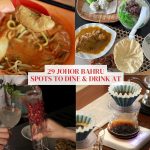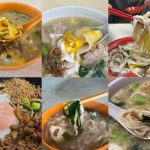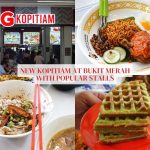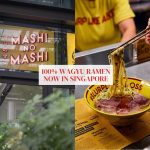Interview: Chef Chan Chen Hei

As one of the most well-known local Chinese masterchefs, chef Chan Chen Hei, 55, is no stranger to playing host to many prominent personalities. His determination and passion to hold on to his traditional roots has truly sealed him as an expert in authentic Cantonese cuisine. Hailing from a humble background, Canton-born Chan arrived in Singapore in 1982 and rose through the ranks at various Chinese restaurants and three major five-star hotels including Hai Tien Lou at the Pan Pacific Singapore. The father of two now owns Chef Chan’s restaurant, an exclusive private dining eatery famous for Chan’s signature crispy-skinned chicken dish.
People have likened your cooking to a form of art. Do you see cooking as an artistic experience?
In a way, my love for historical art-forms, especially ancient Chinese literature and art, is reflected in my cooking. Through my research, I have discovered many traditional recipes that have been lost over the years and I bring them back to life in my cooking. So in that sense, it’s not that my creations are artistic, it’s just that modern society is not familiar with the original cooking methods. Even in terms of presentation, you will find that my dishes differ from most modern styles because I make reference to the past.
Why did you choose to house your restaurant at the National Museum?
The ambience at National Museum is definitely very unique and is very befitting because of my keen interest in ancient Chinese history. Especially since I’ve noticed that there is a lot of reference to food culture written in historical literature, I find the setting ideal.
You have showcased an impressive collection of antiques in your restaurant and that they are part of your personal collection. Why did you choose to place them in the restaurant?
I used to travel a lot to China when I was younger and during those days, I amassed quite a large collection-I even opened an antique shop in Prinsep Street which was more of a hobby than a real business. I found that many of these antiques had a culinary theme to them — be it in terms of utensils, bowls or even furniture, and you can see many of these in my restaurant.
Why did you choose to specialise in the private dining concept, and can you describe the importance of the experience?
I had the idea for this private dining restaurant eight years ago, but it took a while for this to come to fruition. Besides finding a good location, you need a certain level of skill and capital. People come rom far and wide to try my dishes, so I must put my heart and soul into each dish that I cook, and that takes a lot of time. That’s why I believe that each day, if I can serve about four to five dishes that are cooked to perfection, then that day is complete. The quality and attention you get from private dining is definitely very different than if you were to go to a restaurant that serves 200 to 300 guests a day. My greatest desire is to be able to maintain a consistent standard all the time.
You specialise in Cantonese cuisine – can you tell us the key differences between Cantonese cooking and other types of Chinese cooking?
Cantonese cuisine involves various ways of cooking — such as frying or steaming, but it is usually very ‘bland’ compared to other Chinese cooking styles, for example Szechuan. In Cantonese cooking, we always try to retain and emphasise the natural taste of the food-such as the fish or meat, and we don’t mix in a lot of strong spices and flavours like chillies. So the ingredients need to be fresh.
What is the most exotic ingredient you’ve used? Tell us about the experience.
In my early days in Singapore, we were actually the first ones to bring in exotic items like Kobe beef, Australian pumpkin and Canadian seafood. But no matter which countries these items came from, I always cooked them in traditional Chinese style. To me, I believe that a Chinese restaurant must always serve food cooked in the Chinese way, even if it is white truffles or fish roe. So it’s really not about how exotic the ingredient is, but how you cook it that matters.
You have written at least two books and had a brief teaching stint giving cooking lessons. Did you enjoy doing them?
I gave cooking classes nearly 20 years ago just to try out what it was like. I didn’t enjoy it because there wasn’t much of a challenge — maybe because I had to deal with the real basics (like holding the knife) — my students were mainly housewives! I enjoy more of a challenge which cooking gives.
I am actually in the process of completing a new book about the ancient history of Chinese cooking, where I deal with the traditional ways of cooking — including the cooking of wild game — which was part of the culture and lifestyle thousands of years ago. This is targeted at professional cooks and it won’t have basic instructions like how many teaspoons of sesame oil to use etc. It’s coming out very soon, so look out for it.
What is one important lesson you’ve learnt from your years of experience as a top Chinese chef in Singapore?
One thing I’ve observed about the local culinary circle is that many young chefs do not have a good enough foundation. In the past, there used to be an apprentice system, but in Singapore, there isn’t such a thing. I find this unhealthy because a lot of new chefs are quickly hailed master chefs after only working in about five different restaurants or hotels over maybe five years. Yet when they are put to the test, it is clear that they lack experience and depth. No matter how many glowing reports and reviews are written about them, if they do not have a proper foundation, they cannot withstand the test of time. So my advice to young chefs is not to rely on mere ‘packaging’, but truly work on the inner substance that involves working hard over time to hone their skills.
Who or what has the greatest influence on your career?
Besides my “shi fu” (teacher) back in Hong Kong, there are also many old chefs and restaurants in Hong Kong that have had a great influence on me. For example, the famous Fu Lin Men restaurant — considered the “rich man’s canteen” in Hong Kong — has been there for half-a-century, yet they have maintained the same excellent standard and quality till today. I value that because they have stuck to tradition and remained true to the original tastes; they are still brewing the same shark’s fin soup, bird’s nest and abalone after 50 years.




